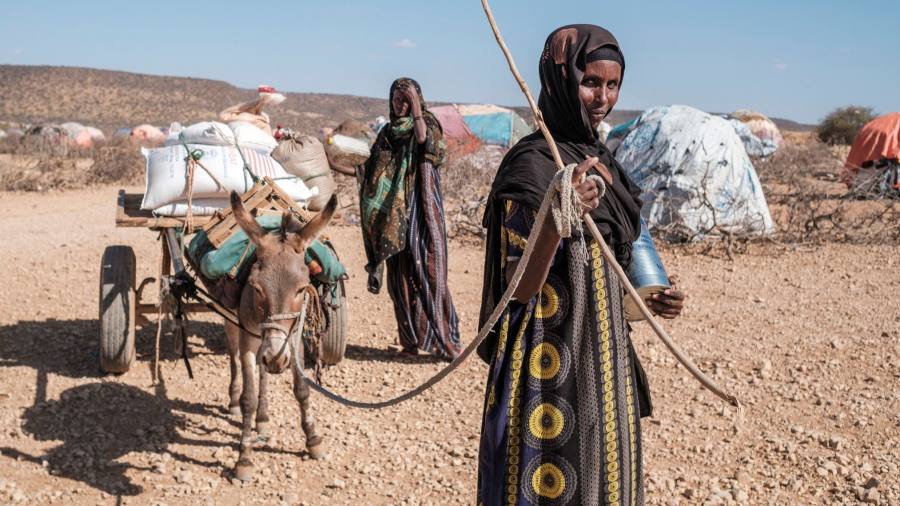
Receive free UK foreign policy updates
We’ll send you a myFT Daily Digest email rounding up the latest UK foreign policy news every morning.
The “grim” human toll of cuts to the UK’s foreign aid budget on women and children, disabled people and LGBT+ communities has been laid bare by an internal government impact assessment.
The analysis by the Foreign Office published on Wednesday revealed that a 38 per cent cut to direct aid allocated to South Sudan this year, which saves £30mn, would leave 27,000 children suffering from severe acute malnutrition untreated, resulting in as many as 3,000 deaths.
A 49 per cent cut to the UK’s “pan Africa” aid budget, saving £47mn, will hit the programme focusing on women’s sexual health across the continent, the report warned. This would see the number of maternal deaths averted fall from 2,530 to just over 1,000 and the number of unsafe abortions averted drop from nearly 300,000 to about 115,000.
The cuts to specific aid programmes followed the controversial decision in 2021 by then-prime minister Boris Johnson to “temporarily” ditch his Conservative party election manifesto commitment to spend 0.7 per cent of gross national income on aid, reducing the target to 0.5 per cent.
The move was part of an attempt by then-chancellor Rishi Sunak, who became prime minister in October, to fix a big hole in the UK’s finances. At the time, Sunak promised to reinstate the original target when the “fiscal situation” allowed.
Since then, the Foreign Office has had to continue to make cuts to foreign aid to balance its own budget. Funds diverted to help Ukrainian refugees after Russia’s full-scale invasion of the country has heaped further pressure on aid spending elsewhere.
The so-called equality impact assessment, which looked at the 21 UK aid programmes facing the largest cash reductions in 2023-24, warned of “severe” consequences for the government’s equalities agenda overseas.
Sarah Champion, the Labour chair of the House of Commons international development committee, which published the analysis, said: “Evidence submitted to the committee over the past few years told us the cuts to UK [overseas aid] would take a human toll. But this astonishingly honest assessment of the real impact makes grim reading.
“It is a litany of the people — living in poverty, suffering hunger, women, girls, disabled people — who will no longer be supported by the UK’s direct aid spending, and the consequences they will face.”
It showed that Bangladesh would lose £43mn in aid this year, a cut of just under half, Ethiopia will lose 29 per cent, or £37mn, and Myanmar 47 per cent equal to £27mn this financial year.
The cuts are expected to hit a project in Ethiopia designed to improve the education of 8,000 children with disabilities, as well as initiatives in Myanmar to bolster LGBT+ groups and protect ethnic and religious minorities such as the Rohingya community, according to the analysis.
Funding for the girls’ education programme has been slashed by 54 per cent (£55mn), while the budgets for the UK partnership for accelerating climate transitions, the international forest unit, and the adaptation, nature and resilience department have all halved.
The assessment was passed to ministers in February and resulted in additional cash being allocated to four countries, including Syria and Yemen, and several programmes to mitigate some of the damage.
Afghanistan received the biggest uplift of the four countries. The budget initially faced a proposed cut of 76 per cent, or £191mn, which would have left women and girls in the nation, whom the Foreign Office acknowledged were among the “most vulnerable” in the world due to persecution by the Taliban, potentially without access to critical services.
The Foreign Office allocated an additional £41mn to the central Asian state, following the findings, resulting in an overall cut in aid of 59 per cent or £150mn.
The Foreign Office said UK aid spending was due to increase to £8.3bn
next year, adding: “While the budget for low-income countries has had
to be reduced in the short term to achieve our savings target, it is
due to nearly double for these countries the year after, including in
Africa where aid will rise from £646mn to £1.364bn.”